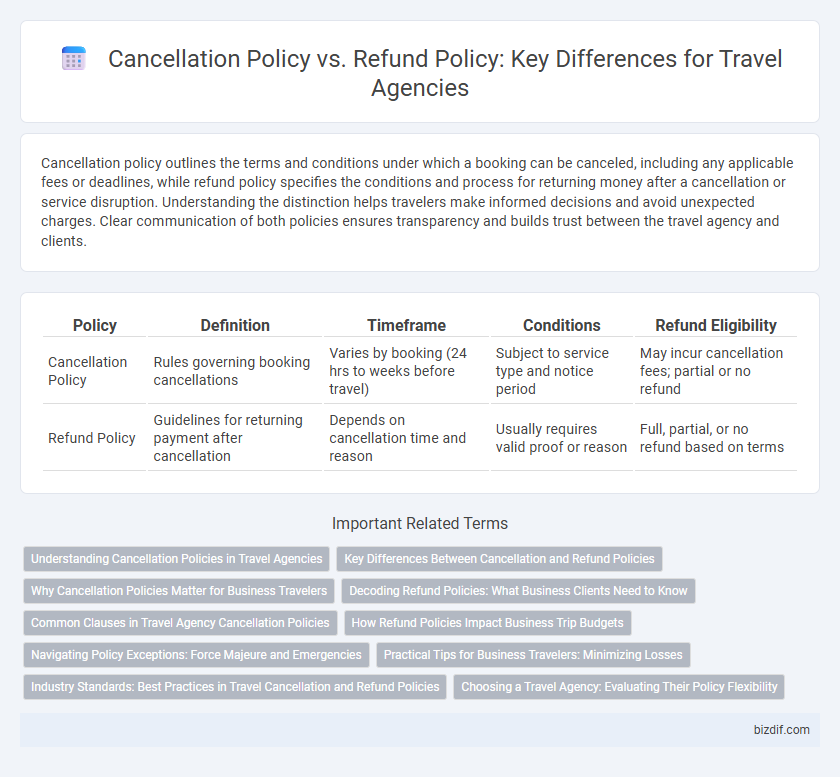Cancellation policy outlines the terms and conditions under which a booking can be canceled, including any applicable fees or deadlines, while refund policy specifies the conditions and process for returning money after a cancellation or service disruption. Understanding the distinction helps travelers make informed decisions and avoid unexpected charges. Clear communication of both policies ensures transparency and builds trust between the travel agency and clients.
Table of Comparison
| Policy | Definition | Timeframe | Conditions | Refund Eligibility |
|---|---|---|---|---|
| Cancellation Policy | Rules governing booking cancellations | Varies by booking (24 hrs to weeks before travel) | Subject to service type and notice period | May incur cancellation fees; partial or no refund |
| Refund Policy | Guidelines for returning payment after cancellation | Depends on cancellation time and reason | Usually requires valid proof or reason | Full, partial, or no refund based on terms |
Understanding Cancellation Policies in Travel Agencies
Understanding cancellation policies in travel agencies is crucial for managing booking changes and avoiding unexpected fees. These policies specify the timeframes and conditions under which travelers can cancel reservations and may include penalties, partial refunds, or non-refundable terms. Clear knowledge of cancellation deadlines and associated charges helps customers make informed decisions and ensures smoother trip planning.
Key Differences Between Cancellation and Refund Policies
Cancellation policies define the conditions under which a travel booking can be canceled, including specific timeframes and associated fees, while refund policies outline the process and eligibility for reimbursing payments after cancellation. Key differences include timing requirements--cancellation policies specify when a cancellation must occur to avoid penalties, whereas refund policies detail the amount and method of fund return based on those cancellations. Understanding these distinctions helps travelers manage expectations and reduce financial risks when altering travel plans.
Why Cancellation Policies Matter for Business Travelers
Cancellation policies protect business travelers from unexpected schedule changes by clearly defining timeframes and penalties for canceling bookings. Refund policies complement these by ensuring travelers receive appropriate reimbursements based on cancellation conditions, enhancing financial predictability. Clear and fair cancellation and refund policies build trust with corporate clients, minimizing disruptions and maintaining loyalty.
Decoding Refund Policies: What Business Clients Need to Know
Understanding refund policies is essential for business clients to avoid unexpected losses during cancellations. Travel agencies often differentiate cancellation policies, which govern timing and penalties, from refund policies that dictate the eligibility and process for money returns. Clear communication on refund deadlines, non-refundable fees, and documentation requirements empowers clients to manage expenses effectively.
Common Clauses in Travel Agency Cancellation Policies
Travel agency cancellation policies commonly include clauses detailing time frames for cancellation eligibility, fees imposed based on how close the cancellation is to the travel date, and non-refundable deposits. These policies often specify exceptions for force majeure events such as natural disasters or government restrictions. Clear communication of such clauses ensures travelers understand penalties and refund possibilities before booking.
How Refund Policies Impact Business Trip Budgets
Refund policies significantly influence business trip budgets by determining the amount of reimbursable expenses when cancellations occur. Strict refund policies can lead to higher out-of-pocket costs, affecting overall travel expenditure management. Flexible cancellation and refund terms enable companies to optimize budget allocations and reduce financial risks associated with unforeseen changes in travel plans.
Navigating Policy Exceptions: Force Majeure and Emergencies
Travel agencies often distinguish between cancellation and refund policies by outlining specific conditions under which exceptions apply, such as force majeure events and emergencies. Force majeure clauses typically cover unforeseen circumstances like natural disasters, political unrest, or pandemics, allowing clients to cancel or reschedule with minimal penalties. Understanding these exceptions helps travelers navigate the complexities of policy enforcement and secure refunds or credits in extraordinary situations.
Practical Tips for Business Travelers: Minimizing Losses
Business travelers should closely review cancellation policies to avoid hefty fees, as many travel agencies charge non-refundable deposits or tiered penalties based on timing. Understanding refund policies helps in selecting flexible tickets or travel insurance that covers unforeseen changes, thus minimizing financial losses. Booking directly with agencies offering transparent cancellation and refund terms enhances the ability to adapt plans without excessive cost.
Industry Standards: Best Practices in Travel Cancellation and Refund Policies
Travel agencies typically follow industry standards that separate cancellation policies from refund policies to ensure clarity and fairness for customers. Cancellation policies generally outline the timeframe and conditions under which a booking can be canceled, often including non-refundable deposits or penalties to manage inventory and revenue. Refund policies specify the eligibility and process for returning funds, commonly adhering to regulations such as the Department of Transportation guidelines and the International Air Transport Association (IATA) recommendations to protect consumer rights while minimizing financial loss for agencies.
Choosing a Travel Agency: Evaluating Their Policy Flexibility
When choosing a travel agency, evaluating the flexibility of their cancellation and refund policies is crucial for risk management and peace of mind. Agencies with clear, customer-friendly policies allowing partial or full refunds and easy rescheduling offer significant advantages in case of unforeseen changes. Understanding terms related to cancellation fees, timeframes for refunds, and exceptions ensures travelers select agencies that prioritize customer satisfaction and financial security.
Cancellation policy vs Refund policy Infographic

 bizdif.com
bizdif.com